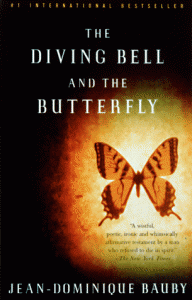‘When I came to that late-January morning the hospital opthalmologist was leaning over me and sewing my right eyelid shut with a needle and thread, just as if he were darning a sock. Irrational terror swept over me.’ These words appear in Jean-Dominique Bauby’s remarkable autobiography, The Diving-Bell and the Butterfly (1997). In 1995 Bauby was at the height of his career as editor-in-chief of French Elle magazine, when he was suddenly struck by a massive stroke. Although his mental faculties were unimpaired, he was left completely paralysed and speechless, a rare condition known as Locked-In Syndrome. The only part of his body he could move was his left eyelid, which he used to ‘dictate’ the book, having developed a system of repeated blinks to represent each letter of the alphabet.
You might think it near impossible to imagine the reality of his experience, to make an empathetic leap into his mind’s eye. Yet Bauby – who died two years after his stroke aged forty-five – conveys his frustrations and despair, as well as his limited pleasures and dreams, with a succinct simplicity and acuteness. He describes the agony of living inside ‘something like a giant invisible diving-bell’ that holds his whole body prisoner, while also relating small moments of irritation, like when a hospital attendant unthinkingly turns off the television when he is halfway through watching a football match with his single good eye. His only real relief is through his imagination, when his mind ‘takes flight like a butterfly’. This is his sole freedom: ‘You can wander off in space or in time, set out for Tierra del Fuego or for King Midas’s court. You can visit the woman you love, slide down beside her and stroke her still-sleeping face.’
In 2007 Julian Schnabel turned Bauby’s book into a film, also called The Diving-Bell and the Butterfly. Its opening sequence is a masterpiece of empathetic cinematography. We are inside Bauby’s head, looking through his left eye as he wakes up in the hospital for the first time after his stroke. His vision is distorted and fragmented. He is surrounded by doctors asking him questions, but he is unable to reply. Yet we hear all Bauby’s confused thoughts through his inner voice as he confronts his utterly changed world.
One reason both the book and film are so compelling is that Bauby helps us recognise the abundance most of us have in our lives. In one imaginative journey he savours his favourite foods, like a plate of sausages and a soft-boiled egg. But fed by a tube, he can no longer partake in such basic culinary pleasures. He describes the joy of a visit from his ten-year-old son and eight-year-old daughter on Father’s Day. Yet it is filled with tragedy: he cannot bear the thought of being unable to touch his children, and he breaks down with grief as they play hangman on the beach. Bauby never, however, asks us to feel sorry for him. He remains a whole person, full of emotional complexity, ambition, desire and dignity despite his physical incapacities. This is what allows his story to be so life-affirming.
The force of the book also lies in what it reveals about Bauby’s character. Reading the publicity quotes, you would think he was a gentle and humane person. One critic describes the author’s ‘gallantry’, and another sees the book as ‘an almost inconceivable act of generosity’. Yet my impression is that, before his stroke, Bauby was not a particularly pleasant individual to be around. I don’t think I would have liked him. He comes across as self-centred and vain. He was a playboy who appeared to have little time for his kids. He was so driven by his career ambitions and desire to live the high-life that he allowed his relationships – especially his marriage – to fall apart.
Despite these traits, I still found myself empathising with him – both in the sense of looking through his eyes and feeling the emotional bond of caring for his welfare. The Diving Bell and the Butterfly shows that it is possible to empathise with people whose lives are not only very different from your own, but whose core values and beliefs you do not share.

This is one of the most profoundly enlightening and moving books I have ever read.Around 8 years ago I gave it to a friend as a “pass it on” book- you read it, write your name and country in it and pass it on. She was in London , last time I heard the book had been to the Gambia, New York, the middle east, Amsterdam and various parts of Canada.
Read this- it will lift your spirit about the human condition and the obstacles we can overcome when we have when we have something to say.
Marie (London)